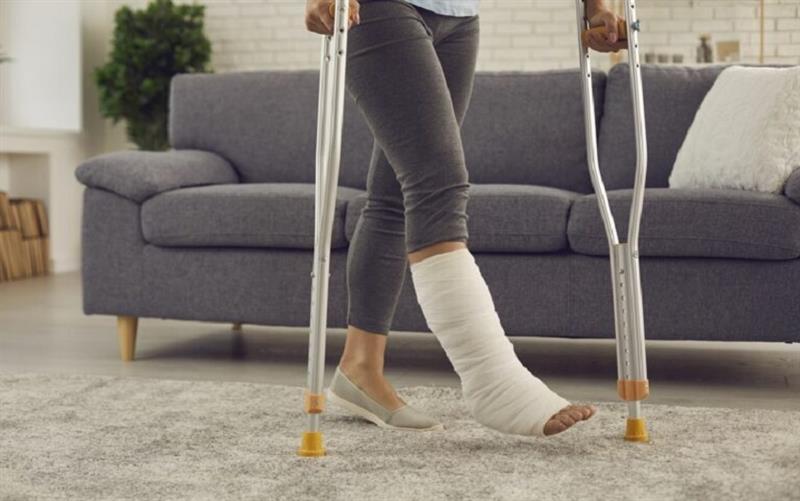
Seniors' mobility frequently becomes an issue as they become older, but selecting the appropriate mobility assistance can greatly enhance their quality of life. Crutches and walkers are two popular choices that are intended to facilitate mobility and increase independence. Which one, nevertheless, is more appropriate for seniors? The response is contingent upon various elements, such as the person's physical state, strength, equilibrium, and particular requirements.
Depending on the senior's individual requirements and physical skills, walkers or crutches may be the better option. For long-term stability, walkers are usually a preferable choice, particularly for people with weaker legs or balance problems. However, if a senior has sufficient upper body strength and needs brief mobility help after an injury, crutches could be a good option.
A walker offers a safer, more sturdy, and more adaptable option for the majority of seniors. Before choosing a choice, it's crucial to speak with a medical expert, such as a physical therapist, to determine the person's needs.
Crutches are mobility aids that assist in shifting the upper body's weight onto the legs. They can be forearm or underarm (axillary) crutches, and they are frequently used for both chronic and acute illnesses that affect one or both legs.
Seniors' Advantages with Crutches:
- Increased Mobility for Particular Injuries: Seniors recuperating from operations or injuries to their legs may find crutches to be quite helpful. Depending on the damage, they permit either full or partial respite from weight bearing.
- Less Obstructive Design: Because crutches are small, they are convenient to use in busy areas and small spaces.
- Increased Speed and Agility: Seniors who possess adequate upper body strength may be able to move more quickly and agilely on crutches as opposed to walkers.
Seniors' Challenges with Crutches:
- Needs a Lot of Upper Body Strength: The arms, shoulders, and core must be strong to use crutches, which can be difficult for elderly people with arthritis or low muscle mass.
- Fall Risk: Using crutches requires dexterity and balance. Crutches can be challenging for elderly people with impaired balance or coordination to use securely.
- Can Be Uncomfortable: Using crutches for an extended period of time, especially underarm crutches, can cause discomfort, skin irritation, and in rare situations, nerve damage.
Walkers are four-legged walking aids that offer steady assistance. There are several different kinds of walkers, including rollators—walkers with four wheels and frequently a seat—two-wheeled walkers, and normal walkers (walkers without wheels).
Walkers' advantages for senior citizens
- Maximum Stability and Support: Walkers provide more stability than crutches, making them perfect for seniors with balance problems. They lessen the chance of falls by dispersing weight over a wider area.
- Customizable for Different Needs: Walkers are available in a variety of designs, so you can select one to meet your unique mobility requirements. Rollators, for example, offer further convenience due to their integrated chairs and baskets.
- Less strain on the Upper Body: Walkers are great for seniors with limited arm or shoulder strength because they don't require as much upper body strength as crutches do.
- Encourages Confidence: Seniors who use walkers may roam around their homes and even outside without worrying about falling since they feel more secure and confident.
Seniors' Challenges with Walkers:
- Slower Movement: Especially in comparison to crutches, walkers may restrict one's speed of movement. This can be frustrating for elders who prefer a quicker pace.
- Unwieldy in Tight Places: Walkers, particularly bigger rollators, can be challenging to handle in confined or cluttered areas.
- Limited Weight Relief for Leg Injuries: Crutches are a better option for injuries needing less leg pressure than walkers, which offer more support but less relief for non-weight-bearing conditions.
How to Decide: Factors to Consider
When determining whether crutches or a walker is best for a senior, several factors come into play. Here’s a breakdown of the most important considerations:
1. Balance and Stability
- Walkers are designed for individuals who need a high level of support and stability. They provide a wide base, making them ideal for those with balance issues or who are prone to falls.
- Crutches require good upper body strength and balance. They’re less stable than walkers, and seniors with balance concerns may find them difficult to use.
- Best for Stability: Walkers. If balance is a primary concern, walkers offer far more security than crutches.
2. Upper Body Strength
- Crutches place significant weight on the arms, shoulders, and upper back. If a senior lacks the necessary upper body strength, crutches could lead to muscle fatigue, joint pain, or even injury.
- Walkers, on the other hand, distribute weight more evenly across the body. They don’t require as much arm strength, making them a better option for seniors with limited upper body power.
- Best for Weak Upper Body: Walkers. Seniors who struggle with upper body strength will find walkers more comfortable and less straining.
3. Mobility and Speed
- Crutches allow for a quicker pace and more flexibility when moving, making them suitable for seniors who only need to support one leg or want to maintain a faster walking speed.
- Walkers are slower and can restrict mobility in tight spaces, but they provide more stability, which can be a critical factor for safety.
- Best for Speed and Agility: Crutches. If mobility and pace are more important, and the senior has sufficient balance, crutches may be the better choice.
4. Injury Type and Recovery
- Crutches are commonly used for short-term injuries like fractures, sprains, or surgery recovery where one leg needs to be non-weight-bearing. They work well for those recovering from lower limb injuries.
- Walkers are better for long-term or chronic conditions, such as arthritis, joint replacements, or age-related weakening of muscles, where consistent support is needed for both legs.